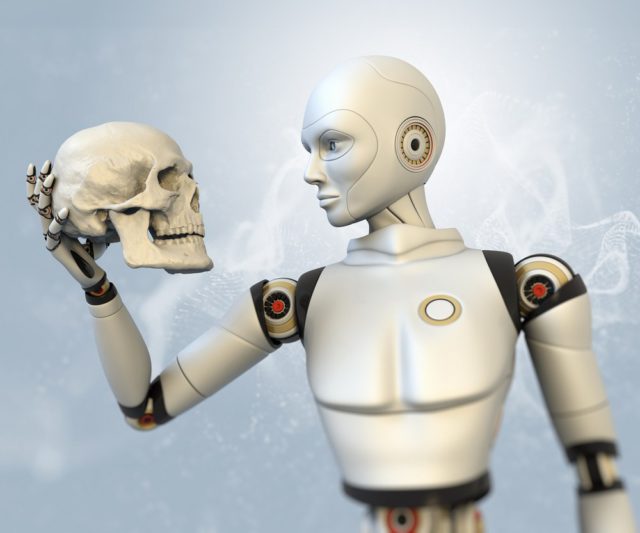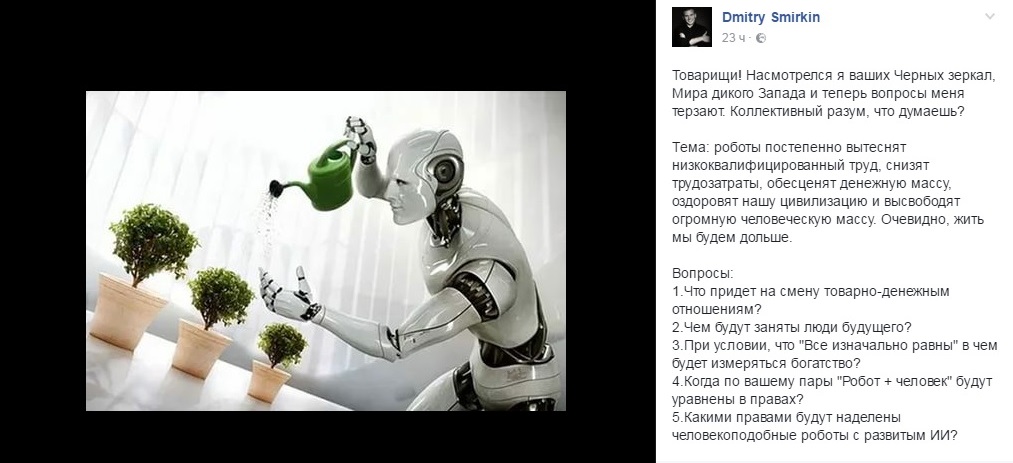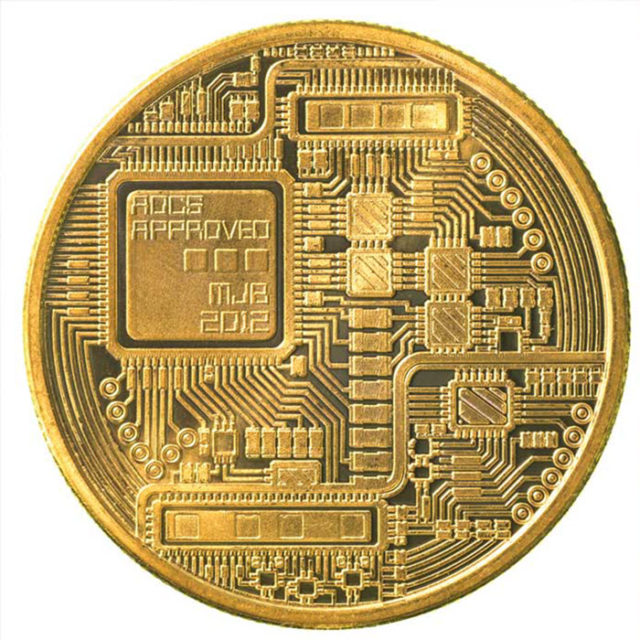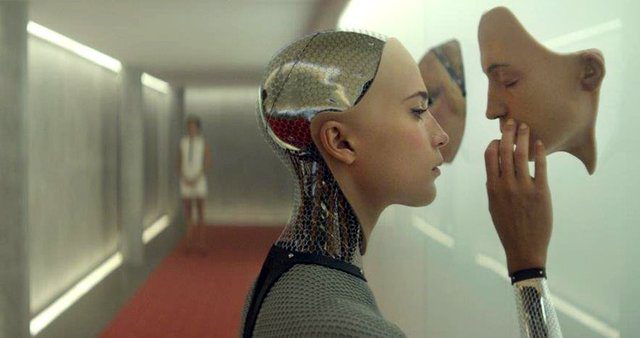Artificial intelligence – a potential enemy or ally and friend?

Just the other day, in the process of reading my tape Facebook, I discovered the post of Dmitry Smirkin, in which he raised questions regarding, possibly, the near future, in which humanity will switch to the active use of robots and advances in the development of artificial intelligence (hereinafter – AI). Thinking about the recording, I realized that the topic is incredibly exciting and wide, it would be very interesting to hear the opinions of our readers. How will massive use of AI change our lives? Let's try to speculate within the framework of this material.

Let's take a closer look at the message of the above entry. It is difficult to surprise with artificial intelligence today, machine learning and neural networks can be safely included in the list of trends of the past year, or even the year before. Everything goes to the fact that at a certain stage, the development of AI will allow humanity to 'give' robots a number of specialties that do not require special qualifications. Science fiction has long foreseen this scenario, the most recent example being the seemingly human-like robot bartender from Passengers. Obviously, the widespread use of a robotic workforce will lead to the disappearance of certain jobs in their standard sense, an increase in labor productivity and business profitability, but also to an overflow of the labor market with candidates for vacancies in other areas. Due to the unpopularity of certain professions among people, specialized educational institutions will be reduced / reorganized to a minimum. As a result, there is a need for the employment of a fairly solid group of people. The absence of physically hard work outsourced to robots will theoretically improve the overall health of people. At first glance, everything is fine.
Most of these optimistic scenarios show us only the tip of the iceberg, in fact, revealing many economic, legal, moral and ethical issues. And, smoothly moving on to the issues raised by Dmitry, it is worth noting that many of the described scenarios, due to the peculiarities of the development of technologies and society, are still perceived as a pure utopia, but this does not reduce the likelihood of their implementation. Nevertheless, the possibility of abandoning the monetary system looks like one example of an overt utopia. Yes, robots do not ask for food, they do not count wages, they work without rest, but in order to completely abolish commodity-money relations, it is necessary to completely replace people's jobs with specialized robots. I don't think this is possible, at least it will take a lot of time.
What alternatives to money and goods can you find? As I mentioned in the comments under Dmitry's post, I immediately remembered the 'Black Mirror' series, in which the main currency and a significant indicator of popularity were likes on the social network that unites all people. Slightly grotesque, but generally instructive example of how not to do it. You can recall another example from the movie 'Time', in which time itself became the currency, and people did not grow old after 25 years, trying to get at their disposal as much time as possible. I will not describe what this led to, so as not to spoil the impression of those who have not yet watched the film. Rejection of the current scheme for organizing financial relations does not seem to be something real and achievable, at least in the foreseeable future for a couple of decades, for this it will be necessary to automate the production of goods as much as possible, but people in any case will not like the idea of universal equality. The solution to the situation may be a natural exchange, but in this case, the exchange of services will become a slower process. My version is a cryptocurrency, which humanity will have to resort to in order to abandon physical money. But, again, this requires a thorough study of all aspects, including security.

The mere fact of having any currency cancels the possibility of equality. In any case, the community will be headed by either a person or an AI programmed by him. And here wealth in the usual sense will play an important role. Achieving communism in the future will be extremely difficult, humanity has lived too long on the concept of consumption to go over to equality for all.
What will the people of the future do? I would bet on the development of science with the help of the same robots and new technologies, that is, those aspects that at a certain stage of human and AI evolution require the intervention of the first. Medicine, energy, space exploration – there are many examples. In any case, if there was a desire, there should be no problems with employment. The 'optimization' of their home planet is likely to be followed by space exploration. Yes, perhaps overly optimistic, there are people who are not quite hardworking and capable of scientific work, but I want to believe.
But will robots always be just labor? It can be assumed that the thought will arise of endowing robots with human rights and responsibilities close to human rights. A shift in public opinion will create a shift in morality, and some members of the human race will seriously consider robots as their potential partners. Why not, the excessive attachment of modern man to the operating system has already been described in the film 'She'. At this stage, the 'machine' of tolerance may turn on and the newly formed social movements will begin to promote to the masses the idea of legalizing relations between humans and robots. This process will require quite a long debate, the ethical and moral side is very ambiguous. How to consider a creature similar to a person in appearance and endowed with a similar intelligence? Should I apply similar restrictions to it? Should we demand from him the same as from a person? Whether to control the development of his intelligence?

The topic of control is also revealed in another aspect: a possible restructuring of slave relations and switching to creatures with AI. Especially if the latter adhere to the 'do no harm' rule. That is, instead of cars, a new class of slaves will appear, which will play into the hands of enterprising characters. Another dilemma is hacking cars and turning them 'evil'. The list of problems is not exhausted. Thus, the idea of equality between humans and robots is probably unattainable by peaceful means.
Sci-fi films and TV series writers reproduce various scenarios of our further communication with AI with varying success, most of them are frankly alarming and frightening. Is humanity so lost the instinct of self-preservation that for the sake of its momentary benefit it will take risks and create essentially its own enemy? How is the widespread use of AI shining on us and what does it threaten us with? There is something to think about.
